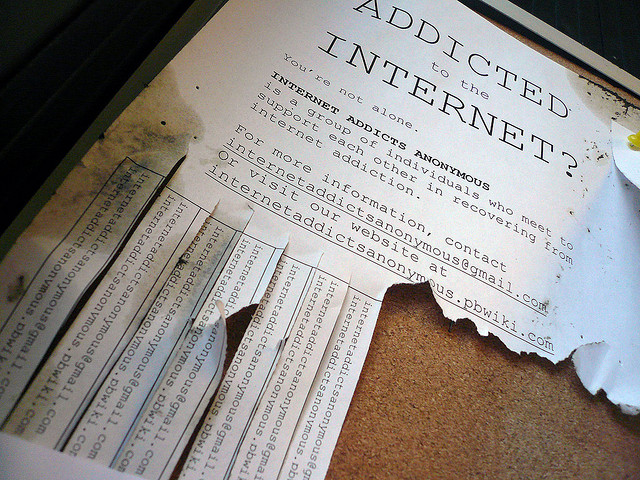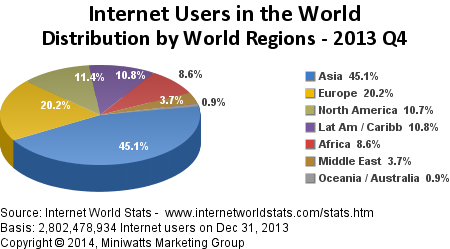How the Internet Has Changed the World

The Internet revolutionised the way we live, learn, communicate and the way we do our business.Today, most of us can’t and won’t imagine our lives without it and we take the existence of the Internet for granted. Younger generations may not be aware of this fact – but us who were born in the 70s and 80s had no other means of communication except letters, telegrams and bulky desk phones when we were teenagers! No Wikipedia, MMO games, email, YouTube videos, social networks, liking, sharing and online courses – just good old books, face to face socialising and playing movies on our VHS player. The Internet has become an ultimate worldwide broadcast “entity” that effected a gigantic upheaval and changed people’s lives for better and for worse.
The area where the Internet made the biggest impact is the way, the speed and the time we spend communicating and interacting with each other. An amazing 72% of all Internet users have a profile on at least one social networking site. Most recent Facebook statistics show that social networks account for approximately 20% of the time spent online, where women spend 30% more time on social websites than men. More importantly, we are able to share everything with people regardless of their geographical location and in just a few seconds.

According to statistics (http://www.internetworldstats.com/stats.htm), there are approximately 3 billion Internet users, while another 4 billion people stay “offline” for the moment. Almost half of the users live in Asia – 44.8% according to the 2012 statistics. Internet penetration is greatest in North America, while African people are still the most unaffected by this marvel of technology. However, through the increasing use of smartphones, the Internet is becoming available to more and more people who will experience all the benefits and downsides of being a user.
Here is one interesting data point: one third of all page views in the UK comes from mobiles and tablets (http://www.smartinsights.com/marketplace-analysis/customer-analysis/new-free-worldwide-digital-media-statistics-reports-starting-with-uk-us-and-europe/). Logically, development of mobile apps has become a huge business, and apps are used by more and more people every single day. These apps have the ability to improve and organise our lives, saving us time and money. Every single activity – from grocery shopping, over closet organising to placing your trade (https://www.vantagefx.co.uk/platforms/mobile-trading) can be simplified with the help of a smartphone and the Internet. To-do lists, tracking your time spent on the computer, organising and sharing your videos, photos and other files, communicating with team members, finding jobs, recipes and even soul mates – you can do it all with the Internet and apps making these activities much easier and faster.
As the Internet infiltrated most of our lives, there are expected downsides of this phenomenon. Illegal activities are handled through the “deep web” and when we say illegal, we aren’t referring to internet piracy only. According to the 2012 research (http://www.symantec.com/about/news/release/article.jsp?prid=20120905_02), every second, 18 people become victims of a cybercrime. These crimes are numerous: from relatively common ones such as social network profile theft and spreading viruses that will crash your PC, to stealing money from bank accounts and child pornography. The next one may not be in the “crime” category, but spreading misinformation and/or panic has become easier than ever as well.
PC, console and mobile gaming began to shape our lives, becoming a favorite hobby of millions throughout the world. The gaming industry is experiencing tremendous development and huge financial success, especially through online multiplayer games. Sadly, many people are diagnosed with being addicted to social networks and these games, neglecting other aspects of their lives. Experts agree with this fact as there are many studies that can confirm it.

For instance, according to a 2010 study by Liu et al., 7% of Chinese students (elementary and high school) suffer from internet addiction, especially boys and students who live in rural areas (http://www.techaddiction.ca/internet_addiction_statistics.html). In Britain, 18% of all surveyed students are considered to be pathological users, and they experienced many problems in their functioning as well as lower self-esteem (Niemz et al., 2005).
These are just a few disadvantages of a “networked” life. Still, they are outnumbered by the advantages and numerous possibilities of using the Internet for a good cause. The beneficial effects that the Internet can have on people’s education and well-being are unparalleled. What we are experiencing now is truly a revolution, as the Internet has a chance of uniting humanity in a common cause and making sure nothing is lost for future generations. Can experts predict what our lives will look like considering such rapid progress? Will we be able to separate our online lives from the “real” world or will we all become addicts, dependent on technology? We will have to wait for the answers.
Edberg M (2014-10-14 11:15:35). How the Internet Has Changed the World. Australian Science. Retrieved: Jul 18, 2025, from http://ozscience.com/technology/internet-changed-world/
 Follow
Follow